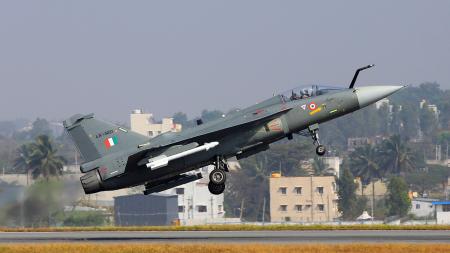 | « Back to article | Print this article |
'Today's situation is unacceptable. It has the potential to affect the IAF's operational capability.'

Air Chief Marshal A P Singh's remarks about Hindustan Aeronautics Ltd sparked a media firestorm this month.
Air Chief Marshal Singh was heard on video, first posted online by news portal Livefist, telling representatives of the country's largest defence manufacturer that the delay in the delivery of fighters to the Indian Air Force was making him lose confidence in the company.
'HAL is our own company,' the air chief said, adding, 'But I find that we are just not in mission mode.'
Sitting in a jet cockpit at this year's Aero India airshow in Bengaluru, Air Chief Marshal Singh expressed, in what was meant to be a private conversation, his concern about the public sector unit's lack of urgency.
Air force veterans say the delay has potential implications for both national security and the Make in India initiative.
While India is the world's largest defence importer, the government has encouraged domestic manufacturing in recent years, following which India's decades-long Light Combat Aircraft (LCA) programme became a focus area.
The sector's preeminent player, HAL, was expected to deliver the first batch of 83 Tejas Mark 1A (Mk1A) fighter jets to the IAF by March 31, 2024.
But almost 12 months later, not one is ready. The deal worth Rs 48,000 crore (Rs 480 billion) was signed in 2021. The IAF wants to buy 97 more fighters from HAL.
A spokesperson for HAL refused to comment.
The company's Chairman and Managing Director D K Sunil told reporters on February 11 that staff 'laziness' wasn't a reason.
He blamed the delay, in part, on supply-chain issues at General Electric, the US company contracted to provide F404 engines to HAL.
The engine issue has since been resolved, Sunil said, adding that at least 11 Mk1A jets would be delivered by this March end.
The pending order, valued at $716 million (signed in 2021), is for 99 GE F404 (IN20) engines and support services for HAL's Mk1A jets.
Eight GE F404 test engines have been delivered to HAL for its ongoing Tejas Mark 2 programme (signed in 2023). GE has delivered 65 F404 engines to HAL in the past.
A spokesperson for GE Aerospace in India told Business Standard, without providing details: "We are sticking to the latest schedule that we have shared with HAL."
At least one of the 99 engines is ready to be delivered shortly, according to an industry source with knowledge of the matter.
A few more are expected to be delivered this year. But it could take four-to-five years to complete the order. The delivery deadline is 2029.
The IAF refused to comment on the matter.
Two IAF veterans said missing timelines by wide margins in defence production could affect combat readiness.
"Technology in warfare is moving fast. You need the equipment to fit the time," retired Air Marshal Sumit Mukerji said.
The IAF plans years in advance. Aircraft -- fighters and trainers -- have shelf life.
"The air force cannot worry about the depletion of fleets and squadrons. Its job is to keep the country secure. It must have up-to-date means to do so," he said.
This is a good time for all the stakeholders -- the Defence Research and Development Organisation, HAL, the ministry of defence and the IAF -- to talk, so that such delays can be avoided in the future, Air Marshal Mukerji said.
The jet engine is one of the most complex things in the world to make. It has to function perfectly at high and low altitudes, temperatures, and pressure, other than speed.
India relies on importing engines because it doesn't have the base to make them. Lately, DRDO has revived its Kaveri engine project.
"We need to move faster on the LCA programme if we want to sit at the global high table of defence production," retired Air Marshal Anil Chopra said.
India isn't the first major country to see delays in making fighter jets. The US has witnessed significant delays in its F-35 production.
"But today's situation is unacceptable. It has the potential to affect the IAF's operational capability," Air Marshal Chopra said.
The veterans said HAL should aim to deliver at least 16 aircraft in the first year, 24 in the next, and ramp up production thereafter.
The government should intervene if supply-chain issues, such as the one attributed to GE, persist, and get more private participation.
Feature Presentation: Aslam Hunani/Rediff.com